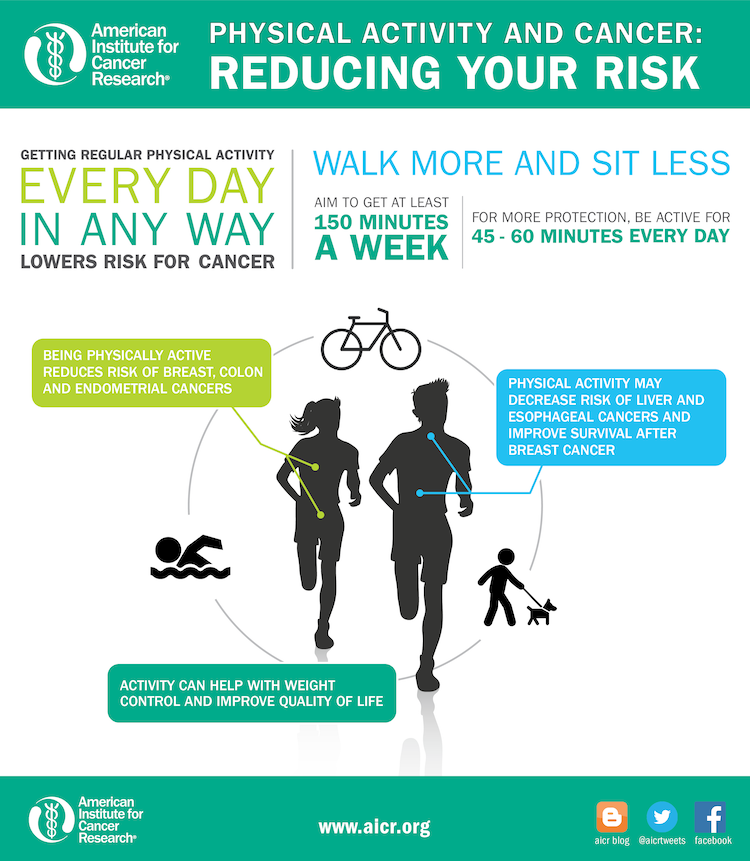June is cancer survivor’s month – an opportune time to talk about new strategies to address a major side effect of many cancer therapies – fatigue. Side effects from cancer can be debilitating but there are strategies to help improve and reduce discomforts. I had the privilege of attending the 2019 AICR Research Conference in Chapel Hill, North Carolina in May. As a certified specialist in oncology nutrition, I appreciate that this conference provides updates on the most current research on nutrition and physical activity for cancer prevention and survivorship. Learning about new research findings allows me to take this enriched knowledge back to the people in the clinic who are seeking information to help them through cancer treatment.
Almost all of my patients struggle with cancer-related fatigue. Cancer-related fatigue is more than being tired. It is more than needing a nap. It is persistent exhaustion regardless of the amount of activity completed that day. This fatigue interferes with a person’s ability to complete even normal daily activities. Being unable to work in your yard, play with your children or grandchildren or spend time enjoying leisurely hobbies significantly decreases quality of life. I often see this side effect lasting years past treatment. Although counter-intuitive, studies show that exercise can lessen the effect of cancer-related fatigue.

Exercise indeed can combat cancer-related fatigue better than pharmaceutical options. A meta-analysis discussed at the AICR Research Conference concluded that exercise and psychological interventions should be the first-line treatment prescribed by clinicians for treatment to combat cancer-related fatigue. The best improvements in cancer-related fatigue were seen in studies that used exercise as the primary treatment, rather than medications or psychological treatment.
In the 1980’s and prior, rest was considered the best care for those receiving cancer treatment. It was not until 2009 that exercise was evaluated as a therapeutic intervention for cancer survivors for the first time. Precisely at this time, my interest as a cancer dietitian was starting to blossom at my first clinical position. We did not have concrete recommendations to share with survivors about exercise until 2012. That year, the American College of Sports Medicine (ACSM) published a paper concluding that exercise was safe for survivors during and after cancer treatment, providing evidence to encourage survivors to engage in exercise.
The exercise regimen for those undergoing cancer treatments is obviously a well-monitored one. Whether patients are getting ready to start a treatment, are currently receiving or have completed treatment, I evaluate their physical activity and muscle mass, and continue to evaluate these parameters during every counseling session for any noticeable decline.
The discussion starts with a review of the ACSM guidelines. I encourage my patients to avoid inactivity as much as possible. If they are going to have a surgery, I recommend returning to daily activities as soon as possible after surgery, and continuing normal activity and exercise as much as possible throughout treatment. If they are currently exercising and it is safe for them to continue, I encourage them to do so and even do more. If they are not exercising but can safely begin, we discuss ways to get started that will work with their lifestyle.
Having the energy to engage in normal daily activities and to return to hobbies is a goal of many of my patients. When cancer-related fatigue improves, quality of life improves. I see the improvement in mood, physical function and in their overall demeanor. Participating in an exercise program through the cancer center or in the community helps provide a structured program with trained experts. I strongly encourage my patients to get involved in a supervised program for best results.
Look for cancer rehabilitation programs in your area. Many local hospitals offer rehabilitation programs like ReVital Cancer Rehabilitation or survivorship exercise classes. LIVESTRONG has partnered with YMCA to create a 12-week physical activity program for survivors. There are professionals who are certified cancer exercise trainers that can be found locally. There are also home-based programs like Onco Move, On Track, and Get Up, Get Moving that are available through the Oncology Nursing Society.
Thirty minutes per day seems doable for those receiving treatment based on studies but some people may need to work up to this level. Exercising at a moderate to vigorous intensity level as much as possible, but again build up to this as necessary. This intensity level may be harder to maintain as the duration of treatment progresses but do your best. Any and all activity will help






Guidelines on Diet and Physical Activity for Cancer Prevention, see here https://www.entirebrain.com/guidelines-on-diet-and-physical-activity-for-cancer-prevention/